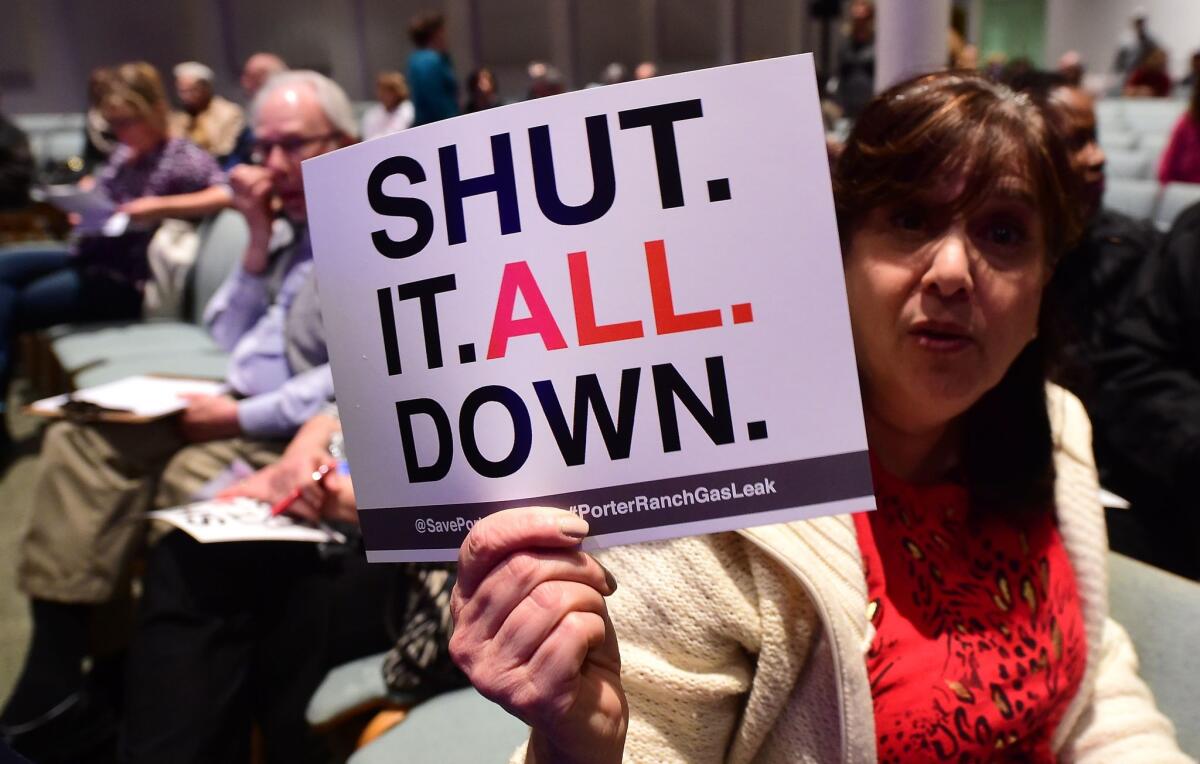Explosion risk stalls plan to capture and burn gas from Porter Ranch leak

Sheryl Goldfarb, who said she has lived in Porter Ranch for 27 years, holds a placard expressing her feelings at a town hall meeting about the gas leak at Shepard of the Hills Church on Friday.
- Share via
The possibility of a catastrophic explosion prompted state regulators Saturday to delay plans to capture and burn leaking natural gas that has sickened and displaced thousands of residents of Porter Ranch
Mohsen Nazemi, deputy executive officer of the South Coast Air Quality Management District, whose hearing board was expected to approve the plan at a public meeting in Granada Hills, acknowledged the proposal was “very unusual” and that the idea is now on hold until local fire officials and state and federal regulators, have signed off on it.
For almost three months, a damaged well at Southern California Gas Co.’s Aliso Canyon reservoir has been spewing noxious fumes and foul odors into nearby communities, raising health concerns. After several failed attempts to plug the well to the underground gas storage reservoir, the company is drilling a relief well to seal off the leak 8,500 feet beneath the surface.
That process isn’t expected to be finished until early February at the earliest.
Give us fresh air. We want to go home.
— Paul Tertian, who left Porter Ranch to escape the gas
So officials, searching for a way to bring residents more immediate relief, came up with the plan to burn the gas. A 3-foot wide pipe would be used to capture the escaping high-pressure gas and burn off those emissions.
Earlier this week, however, the state Public Utilities Commission expressed concerns that the plan “needs further work and analysis.” It said the damaged well could be vulnerable to an explosion or a blowout which would allow even greater release of environmentally damaging gases.
A three-page letter from the PUC to the company included a warning that damage to the well system, which was subjected to two months of aggressive high-pressure pumping to try to plug the leak that began Oct. 23, might now permit air to mix with methane in a way that “could be catastrophic.”
The PUC will not allow gas incineration to begin until the company has resolved concerns about the design of the burn project, an agency official said Saturday.
If the capture and burn plan is eventually deemed safe, air quality officials said they expect to take 20 million cubic feet of natural gas out of the air per day — or roughly half of the leak.
Delay of the burn plan was announced Saturday during a public meeting at Granada Hills Charter High School, where hundreds of San Fernando Valley residents gathered to vent their frustration at company officials and AQMD regulators.
Ed Camarena, the AQMD’s hearing board chairman, said he regretted the panel could not reach a decision on the burn plan. The hearing will resume Wednesday at 9 a.m. at the agency’s office in Diamond Bar.
With the burn plan on hold, AQMD officials turned their attention to longer term measures such as taking the stricken gas well permanently out of service, developing a new plan to notify people when an “air quality event” takes place and conducting a study to assess the health consequences of the leak.
The damaged well, known as SS25, is one of 115 on the massive reservoir. Gas company officials acknowledged there have been leaks at surrounding wells, but said they have been minor and corrected quickly.
SoCal Gas lawyer Robert Wyman told the hearing board that he would oppose any effort to close other wells, saying there’s no proof they are a “nuisance.” He noted that the reservoir is the largest of the company’s four area storage facilities and said the company cannot deliver economical and reliable gas to customers without it.
“This abatement order offers quite a bit that protects the public,” Wyman said.
Those assurances were met with skepticism from the audience, nearly half of whom were waving signs that said, “Shut. It. All. Down.”
Many insisted that they have experienced persistent gas fumes for years and now worry whether they can believe the gas company’s claims that the fumes were the result of routine maintenance.
Meg Volk, a physical therapist and real estate agent in Granada Hills, said, “I have been noticing these odors since 2008.”
Paul Tertian is among thousands who left Porter Ranch to escape the gas. He said he remembers turning to his wife when they first arrived in the area and saying, “Breathe the fresh air. Look at how beautiful it is.”
See more of our top stories on Facebook >>
Now, he’s hoping the company and regulators will stop the leak as quickly as possible. “Give us fresh air. We want to go home.”
Another Porter Ranch resident, Matt Pakucko, said the debate about how to fix the problem misses the point.
“The air district doesn’t need to stall any longer because it has all the information it needs to make the right decision right now: shut down the Aliso facility once and for all.”
Times staff writer Paige St. John contributed to this report.
Twitter: @jackdolanLAT
MORE ON PORTER RANCH GAS LEAK
How much is the Porter Ranch school relocation costing?
Efforts to plug Porter Ranch-area gas leak worsened blowout risk, regulators say
Benzene risk from Porter Ranch gas leak is the same as rest of region, study finds













